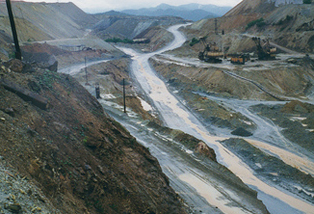Manon Bokuchava, Kvemo Kartli
The government has begun complaining about the pollution of the environment by the “Madneuli” (ores) together with non-governmental organizations. However, several questions are still unanswered. The government has not imposed serious sanctions on the enterprise “Madneuli” for having polluted the environment. So, it is still unclear whether the government does its best to resolve the problem.
On November 3, the Human Rights Center (HRIDC) requested information from the Ministry of Environment and Natural Resources about JSC Madneuli. HRIDC was working on an article focusing on the recent pollution incident by the above enterprise (May, 2010).
If we trust the date of the letter, the Ministry of Environment replied to our letter two months later – on January 16. However, the currier delivered the letter to the HRC at the end of January. Consequently, we had already published the article on the website humanrights.ge (http://humanrights.ge/index.php?a=main&pid=12536&lang=eng).
We learned from the letter of the Ministry that in 2010 JSC “Madneuli” was twice fined. The court found the enterprise guilty in administrative crimes in both cases.
“We kindly inform you that on August 8, 2010 the Kvemo Kartli Regional Bureau of Inspection drew up administrative protocol on the JSC Madneuli enterprise for violating the requirements of the 11th paragraph of Permission # 00174 On the Influence of the Environment. In accordance to the Administrative Code of Georgia, Article 79 (2) the protocol was sent to the district court and JSC Madneuli was found guilty in the violation of the Article 79(2),” the letter of the Ministry reads.
In accordance with the law regarding the environment, the requirement of paragraph 11 of permission # 00174 states: “The administration of the enterprise shall act in accordance with the normative acts estimated by the Ministry of the Environment on September 26, 2007 (registration number # 09-02/17-97) regarding a limited amount of polluted substances released into the rivers. In addition, the enterprise shall report to the Ministry pertaining to the amount and quality of the released polluted substances once per quarter.”
“Madneuli” was fined in accordance with Article 79(2) of the Administrative Code of Georgia which states: “Any activity, which impacts the environment against the requirements of the permission, shall be punished with the fine of 5, 000 GEL.”
The letter of the Ministry of the Environment informed us that Madneuli was fined in October of 2010 under the same law. “Based on the letter of the National Environmental Agency sent to the Environmental Inspection it was reported that JSC Madneuli breached the permission # 00174 requirement 11 regarding the impact on the environment. Thus, the Kvemo Kartli Bureau of Inspection drew up a protocol on administrative crime on October 15, 2010 in accordance with Article 79(2) of the Administrative Code of Georgia and was sent to the corresponding district court which found JSC Madneuli guilty in the administrative offense under Article 79(2) of the Administrative Code,” the letter pertaining to the second fine imposed on Madnueli reads.
Nino Gujaraidze - Head of the association “Green Alternative” suggested that we pay attention to one detail in the letter: the Ministry of Environment informed the Human Rights Center about lab samples taken from the River Kazretula on May 22, 2010 and added that the test results were sent to the Kvemo Kartli Regional Investigation group of the ministry. Nevertheless, the Ministry did not inform the Center about the results of the lab tests.
We kindly remind you that our article about pollution was about the incident which occurred in May. So, the Ministry could not answer our question about the pollution in the River Mashavera in May.
The locals reported that dead fish were removed from the River in May. The Ministry did not send the monitoring results on the quantity of hard metals in the river, so we could not compare the results. The test was done in 2010 as it is indicated in the document. The Ministry did not send the results of the monitoring in the River Kazretula. The reports of the environmentalists claim that the River Mashavera is polluted by the River Kazretula which flows into it. The latter is flowing next to the Madneuli enterprise.
“As for the pollution in the River Mashavera, unfortunately, as you know, non-governmental organizations cannot afford to check the data provided by the Ministry, so we cannot comment on the fact. Though, I want to point out that the data provided by the Ministry demonstrates high concentration of pollution in the river and it is really alarming,” said Nino Gujaraidze.
Based on the letter we can conclude that in 2010 Madnueli was fined twice. In total, in accordance to the Article 79(2) of the Administrative Code of Georgia the enterprise has paid 10, 000 GEL to the budget. This money is nothing for the enterprise which earns millions. In fact, the threat to the environment and population caused by the activities of Madneuli is more expensive and important.
Years ago, Georgian doctors complained about ecological problems in the Bolnisi district. For example, Davit Tatishvili’s Center alleged that because of the ecological situation in Bolnisi cancer diseases are concentrated in the area. The Bolnisi district authority requested the Tatishvili Medical Center to examine the local population. 253 out of an examined 706 women had mastopathy of the breast. Soon, every medical center and among them Tatishvili’s Clinic too stopped talking about this topic. That time the Bolnisi municipal board sent letters to medical centers and banned them from releasing information regarding the health conditions of the local population without agreeing with them because of “district interests.”
News
December 13, 2023
Ethnic minorities outside the peace dialogue
November 6, 2023
‘Peace’ agenda of political parties
Popular
Articles
February 13, 2024




